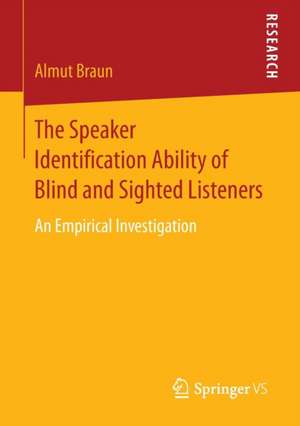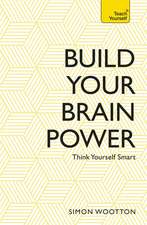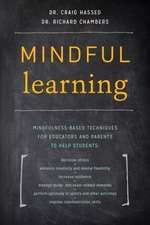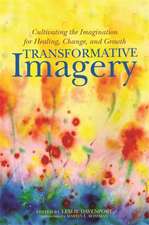The Speaker Identification Ability of Blind and Sighted Listeners: An Empirical Investigation
Autor Almut Braunen Limba Engleză Paperback – 8 aug 2016
Preț: 378.92 lei
Nou
Puncte Express: 568
Preț estimativ în valută:
72.50€ • 75.71$ • 59.87£
72.50€ • 75.71$ • 59.87£
Carte tipărită la comandă
Livrare economică 16-30 aprilie
Preluare comenzi: 021 569.72.76
Specificații
ISBN-13: 9783658151973
ISBN-10: 3658151978
Pagini: 159
Ilustrații: XXVI, 133 p. 19 illus.
Dimensiuni: 148 x 210 x 9 mm
Greutate: 0.2 kg
Ediția:1st ed. 2016
Editura: Springer Fachmedien Wiesbaden
Colecția Springer VS
Locul publicării:Wiesbaden, Germany
ISBN-10: 3658151978
Pagini: 159
Ilustrații: XXVI, 133 p. 19 illus.
Dimensiuni: 148 x 210 x 9 mm
Greutate: 0.2 kg
Ediția:1st ed. 2016
Editura: Springer Fachmedien Wiesbaden
Colecția Springer VS
Locul publicării:Wiesbaden, Germany
Cuprins
Forensic speaker identification/speaker recognition.- Earwitness memory of blind and sighted listeners.- Blind listeners’ auditory abilities and sensory compensation.- Parameters which influence listeners’ speaker identification abilities.- Issues to consider when creating a forensic phonetic voice lineup / voice parade.
Notă biografică
Almut Braun was a doctoral candidate in the Department of Phonetics at Philipps-Universität Marburg, Germany. She works currently as a Research Associate in the Department of Language and Linguistic Science at the University of York, UK.
Textul de pe ultima copertă
Almut Braun carried out forensic phonetic speaker identification experiments (voice lineups) with 306 lay listeners. Blind listeners significantly outperformed sighted listeners when the speech recordings were presented in studio quality. For recordings in mobile phone quality or of whispering voices, blind and sighted listeners achieved similar results. The data can be used as reference material for real cases with blind earwitnesses. Furthermore, it is discussed whether blind individuals are particularly suitable to work as forensic audio analysts for law enforcement agencies.
The Contents
Almut Braun was a doctoral candidate in the Department of Phonetics at Philipps-Universität Marburg, Germany. She works currently as a Research Associate in the Department of Language and Linguistic Science at the University of York, UK.
The Contents
- Forensic speaker identification/speaker recognition
- Earwitness memory of blind and sighted listeners
- Blind listeners’ auditory abilities and sensory compensation
- Parameters which influence listeners’ speaker identification abilities
- Issues to consider when creating a forensic phonetic voice lineup / voice parade<
- Researchers and students in the field of (forensic) Phonetics, Psychology (person/voice recognition) and Law
- Forensic Phoneticians/Speech Scientists, staff of Criminal Police Offices, members of the International Association for Forensic Phonetics and Acoustics
Almut Braun was a doctoral candidate in the Department of Phonetics at Philipps-Universität Marburg, Germany. She works currently as a Research Associate in the Department of Language and Linguistic Science at the University of York, UK.
Caracteristici
Publication in the field of social sciences Includes supplementary material: sn.pub/extras







